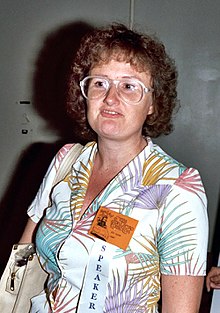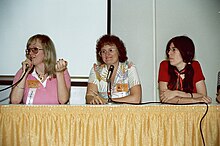Lee Marrs
| Lee Marrs | |
|---|---|
 Marrs at the 1982 San Diego Comic Con (today called Comic-Con International). | |
| Born | September 5, 1945 |
| Nationality | American |
| Area(s) | Cartoonist, Writer |
Notable works | The Further Fattening Adventures of Pudge, Girl Blimp |
| www | |
Lee Marrs (born September 5,[1] 1945)[2] is an American cartoonist and animator, and one of the first female underground comix creators. She is best known for her comic book series The Further Fattening Adventures of Pudge, Girl Blimp, which lasted from 1973 to 1977.
Work
[edit]Early career
[edit]Lee Marrs grew up in Montgomery, Alabama,[3] and attended American University, graduating in 1967 with a degree in fine arts.[4] During her time at American University, Marrs was introduced to comic strip artist Tex Blaisdell by his daughter, with whom she attended school.[3] Marrs then began assisting Blaisdell, working on comics such as Little Orphan Annie, Prince Valiant, and Hi and Lois. [3] At the same time, Marrs also worked for CBS News in Washington, DC, at WTOP, where she created artwork for the station and also drew live editorial cartoons on Saturday nights.[3] Marrs was as a graphic artist on an Emmy-Award-winning animation about the 1968 riots.[5]
In the late 1960s, Marrs moved to San Francisco, where she helped found Alternative Features Service, a news service that supplied college and underground newspapers with feature stories.[3] Through the Alternative Features Service, Marrs met Trina Robbins, who would introduce her to the underground comix movement.[3]
Underground comics
[edit]Marrs was a frequent contributor to underground comix and one of the "founding mommies" of the Wimmen's Comix collective. In the first issue of Wimmen's Comix (1972), Marrs' "All in a Day's Work" epitomizes how a woman's only leverage in a male-dominated society is to utilize her body to negotiate politics. Marrs' comic emphasizes the idea that equality for all women is equality not only of entrance but equality of execution. The last section of Marrs' comic "positions the naked female body as a panel divider, [and] viscerally connects the female body to the comics form."[6][7][8]
Marrs provided stories for the underground titles Wet Satin, Manhunt, El Perfecto, and Gates of Heaven. Her parodies often substituted lesbians in place of heterosexual figures, as in feature strips in the long-running Gay Comix. Her story, "My Deadly Darling Dyke," published in Gay Comix #3 (Dec. 1982) is a popular and outspoken interdisciplinary crossover between queer identity and a cheeky parody of gothic melodrama.[9]
As one of Mike Friedrich's Star Reach regulars, she expanded her writing and art style to include serious fantasy fiction in Stark's Quest (1977–1979), a study of ESP, politics, and social engineering. From this body of work, "Waters of Requital" (1977) is especially powerful. She created short futuristic graphic tales for Heavy Metal magazine, Epic Illustrated, and Imagine magazine.
The Further Fattening Adventures of Pudge, Girl Blimp
[edit]The Further Fattening Adventures of Pudge, Girl Blimp is a three-part comic book series about an overweight seventeen-year-old girl named Pudge who hitchhikes to San Francisco at the height of the counterculture movement with the goal of losing her virginity. The series addresses themes of feminism, sexual orientation, racial diversity, and body positivity.[10] The first issue of Pudge, Girl Blimp was published by Last Gasp Eco Funnies in 1973, while the final two issues were published by Star Reach in 1975 and 1977.[11] In 2016, Marrs published a complete edition of Pudge, Girl Blimp which was nominated for an Eisner Award in 2017.[12]
Mainstream comics
[edit]Marrs was one of few underground cartoonists to also work for mainstream comics publishers. She was introduced to DC Comics editor Joe Orlando by Tex Blaisdell. After working on DC’s Plop!, Weird Mystery Tales, and House of Secrets, she created "Crazy Lady" (1975), a series about growing up female, for Marvel Comics’ Crazy magazine. Much of her mainstream comics work was as a writer, including Wonder Woman Annual 1989, Viking Glory: the Viking Prince (DC, 1991), and Zatanna: Come Together (DC, 1993).
She wrote Dark Horse Comics' series Indiana Jones and the Arms of Gold (1994) and Indiana Jones and the Iron Phoenix (1995), both of which were drawn by Leo Duranona.
In 1986 Blackthorne Publishing published Pre-Teen Dirty-Gene Kung Fu Kangaroos, a three-issue series created by Marrs which parodyied the original Teenage Mutant Ninja Turtles comic book series, as well as the American Flagg! comic book series.[13]
Animation
[edit]Lee Marrs runs Lee Marrs Artwork, a digital design and animation company. She worked in 2D digital animation in the early 1980s. Her clients have included Disney/ABC, Apple Computer, IBM, Time Warner Inc., Children's Television Workshop, Nickelodeon, Electronic Arts, and MTV.[citation needed]
Impact and influence
[edit]
Lee Marrs' comics influenced feminism, queer theory, and visual culture in the 1980s. Her comics explore how women participated in the feminist wave while they were understanding and exploring their queer sexuality. In the era when the Equal Rights Amendment had come to the forefront, feminists believed that women as human beings were denied the chance to develop their fullest human potential. Marrs produced the four-page “Equal Rites” for Wimmen’s Comix #8, where female protagonists live in a futuristic world where standards are mono-gendered, and the implementation of the ERA amendment has blossomed; the glass ceiling for feminist stereotypes has been shattered.[14][6]
In a media interview, Marrs discussed prejudice from leaders of the feminist movement, and how feminists critique female comic authors who think outside the box:[10] "But we got totally rejected by the women's movement, for the most part. Not just that Ms. magazine wouldn't run us, but bookstores across the country wouldn't carry us, because we did not have a heavy, traditional, feminist political line."[15]
Marrs equates these concrete examples with rejection, for they foreclose the ability of the collective to reach a broader feminist audience despite their varied attempts to participate. Her quotation also foregrounds their comics as something done differently from the feminist norm in their content, even though Marrs also equates their comics with the "work[ing] through" that happened in consciousness-raising group."[10]
Awards
[edit]Marrs was awarded the Comic-Con International Inkpot Award in 1982.[16]
Marrs won an Emmy for her work as an animation director.[17][18]
See also
[edit]Further reading
[edit]- "Pudge, Girl Blimp" in The Spectacular Sisterhood of Superwomen: Awesome Female Characters from Comic Book History by Hope Nicholson, Quirk Books (2017)
References
[edit]- ^ Miller, John Jackson (June 10, 2005). "Comics Industry Birthdays". Comics Buyer's Guide. Archived from the original on February 18, 2011. Retrieved December 12, 2010.
- ^ Marrs entry, in "Marriage à la Mode" to "Marrying Kind," Michigan State University Libraries, Special Collections Division, Reading Room Index to the Comic Art Collection.
- ^ a b c d e f ""Wimmen's Comix" Co-Founder Lee Marrs Reflects On a Storied Career". CBR. 2015-12-21. Retrieved 2018-11-09.
- ^ "AU Library Archives / Special Collections: New and Noteworthy » Celebrating AU Alumni: Lee Marrs". blogs.library.american.edu. 16 July 2015. Retrieved 2018-11-09.
- ^ "(Annette) Lee Marrs, CAS/BA '67 | American University, Washington, DC". 2013-01-19. Archived from the original on 2013-01-19. Retrieved 2023-08-02.
{{cite web}}: CS1 maint: bot: original URL status unknown (link) - ^ a b Huffer, Lynne (June 2015). "Are the Lips a Grave? A Queer Feminist on the Ethics of Sex". Signs: Journal of Women in Culture and Society. 40 (4): 996–999. doi:10.1086/680406. ISSN 0097-9740.
- ^ Huffer, Lynne. Are the Lips a Grave? A Queer Feminist on the Ethics of Sex (New York: Columbia University Press, 2013).
- ^ Berger, Anne Emmanuelle. The Queer Turn in Feminism: Identities, Sexualities, and the Theater of Gender. (New York: Fordham University Press, 2014).
- ^ Gomez, Betsy. CBLDF Presents: She Changed Comics (Image Comics, 2016) ISBN 978-1632159298.
- ^ a b c Galvan, Margaret (Fall–Winter 2015). "Feminism Underground: The Comics Rhetoric of Lee Marrs and Roberta Gregory". Women's Studies Quarterly. 43 (3–4): 203–222. doi:10.1353/wsq.2015.0043. S2CID 86126732.
- ^ Fox, M. Steven (2013). "The Further Fattening Adventures of Pudge, Girl Blimp". comixjoint.com. Retrieved 2018-11-30.
- ^ Estrella, Ernie (2017-05-02). "Fantagraphics and Image Comics lead Eisner Awards nominations". SYFY WIRE. Archived from the original on 2018-12-01. Retrieved 2018-11-30.
- ^ Becattini, Alberto (2019). "Super-Animals". American Funny Animal Comics in the 20th Century: Volume Two. Theme Park Press. ISBN 978-1683902218.
- ^ Galvan, Margaret. "Archiving the '80s: Feminism, Queer Theory, & Visual Culture," a dissertation submitted to the Graduate Faculty in English in partial fulfillment of the requirements for the degree of Doctor of Philosophy, The City University of New York (2016).
- ^ 1979 interview, p. 24.[citation needed]
- ^ "Inkpot Award". Comic-Con International: San Diego. 2012-12-06. Retrieved 2018-11-30.
- ^ cbldf (2015-03-20). "Women Who Changed Free Expression: Underground Comix – Comic Book Legal Defense Fund". Retrieved 2023-08-02.
- ^ "Pride-ographies: Lee Marrs". SYFY Official Site. 2020-06-12. Retrieved 2023-08-02.
